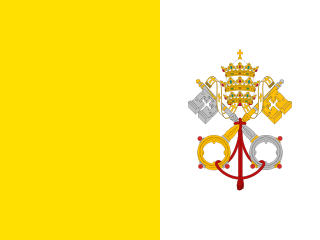
A condom is a sheath-shaped barrier device, used during sexual intercourse to reduce the probability of pregnancy or a sexually transmitted infection (STI). There are both male and female condoms. With proper use—and use at every act of intercourse—women whose partners use male condoms experience a 2% per-year pregnancy rate. With typical use the rate of pregnancy is 18% per-year. Their use greatly decreases the risk of gonorrhea, chlamydia, trichomoniasis, hepatitis B, and HIV/AIDS. They also to a lesser extent protect against genital herpes, human papillomavirus (HPV), and syphilis.

Humanae vitae is an encyclical written by Pope Paul VI and dated 25 July 1968. The text was issued at a Vatican press conference on 29 July. Subtitled On the Regulation of Birth, it re-affirmed the orthodox teaching of the Catholic Church regarding married love, responsible parenthood, and the rejection of artificial contraception. In formulating his teaching he explained why he did not accept the conclusions of the Pontifical Commission on Birth Control established by his predecessor, Pope John XXIII, a commission he himself had expanded.

Safe sex is sexual activity using methods or devices to reduce the risk of transmitting or acquiring sexually transmitted infections (STIs), especially HIV. "Safe sex" is also sometimes referred to as safer sex or protected sex to indicate that some safe sex practices do not completely eliminate STI risks. It is also sometimes used to describe methods aimed at preventing pregnancy.
Casti connubii was a papal encyclical promulgated by Pope Pius XI on 31 December 1930 in response to the Lambeth Conference of the Anglican church. It stressed the sanctity of marriage, prohibited Catholics from using any form of artificial birth control, and reaffirmed the prohibition on abortion. It also explained the authority of Church doctrine on moral matters, and advocated that civil governments follow the lead of the Church in this area.

Criticism of the Catholic Church includes the observations made about the current or historical Catholic Church, in its actions, teachings, omissions, structure, or nature. The logical disagreements are covered on a denominational basis. Criticisms may regard the concepts of papal primacy and supremacy, or aspects of church structure, governance, and particular practices. Since the Catholic Church is the largest Christian church representing over half of all Christians and one sixth of the world's population, these criticisms may not necessarily represent the majority view of all Christians and non-Christians.

The Catholic Church, also known as the Roman Catholic Church, is the largest Christian church, with approximately 1.3 billion baptised Catholics worldwide as of 2017. As the world's "oldest continuously functioning international institution", it has played a prominent role in the history and development of Western civilisation. The church is headed by the Bishop of Rome, known as the pope. Its central administration, the Holy See, is in the Vatican City, an enclave within the city of Rome in Italy.
Prior to the 20th century, three major branches of Christianity generally held a critical perspective of birth control, including the leading Protestant reformers Martin Luther and John Calvin. Among Christian denominations today, however, there is a large variety of positions towards birth control.
Pope John Paul II was criticised, amongst other things, for lack of any response to sex abuse of children in the Church.
Natural family planning (NFP) comprises the family planning methods approved by the Roman Catholic Church and some Protestant denominations for both achieving and postponing or avoiding pregnancy. In accordance with the Church's teachings regarding sexual behavior, NFP excludes the use of other methods of birth control, which it refers to as "artificial contraception."
The Danube Seven — Christine Mayr-Lumetzberger, Adelinde Theresia Roitinger, Gisela Forster, Iris Muller, Ida Raming, Pia Brunner and Angela White — are a group of seven women from Germany, Austria and the United States who were ordained as priests on a ship cruising the Danube river on 29 June 2002 by Rómulo Antonio Braschi, Ferdinand Regelsberger, and third unknown bishop.
Contraception was illegal in Ireland from 1935 until 1980, when it was legalised with strong restrictions, later loosened. The ban reflected Catholic teachings on sexual morality.
Religious adherents vary widely in their views on birth control. This can be true even between different branches of one faith, as in the case of Judaism. Some religious believers find that their own opinions of the use of birth control differ from the beliefs espoused by the leaders of their faith, and many grapple with the ethical dilemma of what is conceived as "correct action" according to their faith, versus personal circumstance, reason, and choice.
Abstinence, be faithful, use a condom, also known as the ABC strategy or abstinence-plus sex education, also known as abstinence-based sex education, is a sex education policy based on a combination of "risk avoidance" and harm reduction which modifies the approach of abstinence-only sex education by including education about the value of partner reduction safe sex and birth control methods. Abstinence-only sex education is strictly to promote the sexual abstinence until marriage, and does not teach about safe sex or contraceptives. The abstinence-based sex education program is meant to stress abstinence and include information on safe sex practices. In general terms, this strategy of sex education is a compromise between abstinence-only education and comprehensive sex education. The ABC approach was developed in response to the growing epidemic of HIV/AIDS in Africa, and to prevent the spread of other sexually transmitted diseases. This approach has been credited by some with the falling numbers of those infected with AIDS in Uganda, Kenya and Zimbabwe, among others. From 1990 to 2001 the percentage of Ugandans living with AIDS fell from 15% to between 5 and 6%. This fall is believed to result from the employment of the ABC approach, especially reduction in the number of sex partners, called "Zero-Grazing" in Uganda.
Roman Catholic Womenpriests (RCWP) is an independent international organization that asserts a connection to the Roman Catholic Church. It is descended from the Danube Seven, a group of women who assert that they were ordained as priests in 2002 by Rómulo Antonio Braschi, before being excommunicated by the Vatican, and their request for a revocation of the excommunication denied, in Decree on the Attempted Ordination of Some Catholic Women. According to a book published by the organization, Women Find a Way: The Movement and Stories of Roman Catholic Womenpriests, at least two other unnamed bishops were involved in the ordination. In addition, the RCWP considers these bishops to be in good standing, and the RCWP says the bishops acted in full apostolic succession.

Catholic theology of sexuality, like Catholic theology in general, is drawn from natural law, canonical scripture, divine revelation, and sacred tradition, as interpreted authoritatively by the magisterium of the Catholic Church. Sexual morality evaluates sexual behavior according to standards laid out by Catholic moral theology, and often provides general principles by which Catholics are able to evaluate whether specific actions meet these standards. Much of the Church's detailed doctrines derive from the principle that "sexual pleasure is morally disordered when sought for itself, isolated from its procreative and unitive [between spouses] purposes". At the same time, the Bishops at Vatican II decreed that the essential procreative end of marriage does not make "the other purposes of matrimony of less account."
Post Vatican II history of the Catholic Church includes the recent history of the Catholic Church since the Second Vatican Council.
The Women's Ordination Conference is the oldest and largest organization in the United States that works to ordain women as deacons, priests, and bishops in the Roman Catholic Church. Founded in 1975, it primarily advocates for the ordaining of women within the Catholic Church. The idea for the Conference came in 1974, when Mary B. Lynch asked the people on her Christmas list if it was time to publicly ask "Should Catholic women be priests?" 31 women and one man answered yes, and thus a task-force was formed and a national meeting was planned. This first meeting was held in Detroit, Michigan, on Thanksgiving weekend of 1975, with nearly 2,000 people in attendance.
The Catholic Church's position on HIV/AIDS prevention has attracted controversy due to its opposition to condom use. In 2010 Pope Benedict XVI said that the use of condoms could sometimes be considered a first step toward moral behavior, but a spokesperson for the church later clarified that the use of condoms was still considered immoral and that the pope had not intended to take a position "on the problem of condoms in general." In relation to the sexual transmission of the disease, the Church teaches that chastity, are a better means of limiting the spread of the epidemic than the use of condoms. United Nations bodies have criticised the Church for its stance against condom use, on the basis that condoms are the best available means to prevent infections among sexually active people. UN bodies co-operate closely with the Church on the provision of patient care, and in eliminating infections in children.

Sex and gender roles in the Roman Catholic Church have been the subject of both intrigue and controversy throughout the Church's history. The cultural influence of the Catholic Church has been vast, particularly upon western society. Christian concepts, introduced into evangelized societies worldwide by the Church, had a significant impact on established cultural views of sex and gender roles. Human sacrifice, slavery, infanticide and polygamy practiced by cultures such as those of the Roman Empire, Europe, Latin America and parts of Africa came to an end through Church evangelization efforts. Historians note that Catholic missionaries, popes and religious were among the leaders in campaigns against slavery, an institution that has existed in almost every culture and often included sexual slavery of women. Christianity affected the status of women in evangelized cultures like the Roman Empire by condemning infanticide, divorce, incest, polygamy and marital infidelity of both men and women. Some critics say the Church and teachings by St. Paul, the Church Fathers and scholastic theologians perpetuated a notion that female inferiority was divinely ordained, even though official Church teaching considers women and men to be equal, different, and complementary.
The relationship between religion and HIV/AIDS is complicated, and often controversial. Controversies have mainly revolved around LGBT people and condom use.











